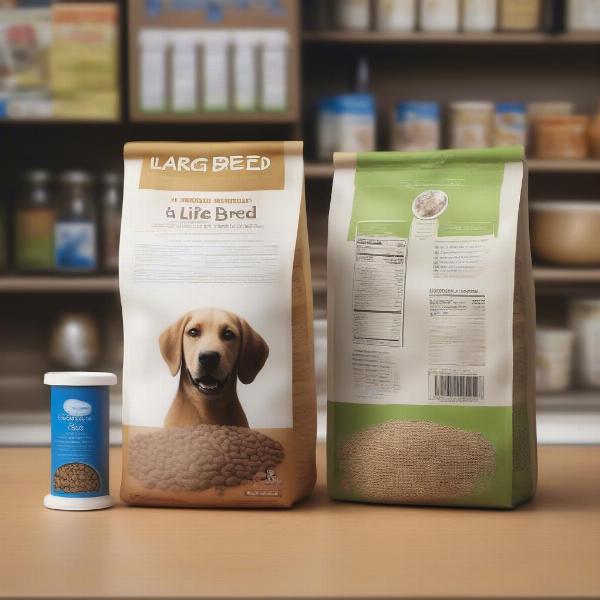Finding the right food for your Great Pyrenees puppy is crucial for their growth and development. A large breed like the Great Pyrenees has specific nutritional needs, and choosing the best food can be overwhelming. This guide will help you navigate the options and select the perfect diet for your fluffy giant.
Nutritional Needs of a Great Pyrenees Puppy
Great Pyrenees puppies grow rapidly and require a diet rich in protein and calcium to support healthy bone and joint development. Look for puppy food formulated for large breeds, as these typically have controlled calcium levels to prevent skeletal issues later in life. These formulas also contain optimal levels of glucosamine and chondroitin, which are beneficial for joint health.
Choosing the Right Food for Your Great Pyrenees Puppy
 Comparing dog food labels
Comparing dog food labels
When selecting food, focus on high-quality ingredients. Meat should be the first ingredient, followed by whole grains or vegetables. Avoid foods with fillers, artificial colors, flavors, and preservatives. Look for the Association of American Feed Control Officials (AAFCO) statement to ensure the food meets nutritional standards. Reading reviews and consulting with your veterinarian can also provide valuable insights. Remember, what works for one puppy might not work for another.
Dry Food vs. Wet Food for Great Pyrenees Puppies
Both dry and wet food have their pros and cons. Dry food is generally more affordable and convenient to store. Wet food has higher moisture content, which can be beneficial for puppies who don’t drink enough water. You can also mix wet and dry food to provide variety and entice picky eaters.
Feeding Schedule and Portion Control
Overfeeding can lead to rapid weight gain, which can stress a Great Pyrenees puppy’s developing joints. Follow the feeding guidelines on the food packaging, but adjust the portions based on your puppy’s individual needs and activity level. Divide the daily food allowance into several smaller meals throughout the day to prevent bloating. Monitor your puppy’s weight and body condition regularly and consult your veterinarian if you have any concerns.
Transitioning to Adult Food
As your Great Pyrenees puppy approaches adulthood (around 12-18 months), you’ll need to transition them to adult food. Do this gradually over a week or two by mixing increasing amounts of the new food with their current puppy food. This helps prevent digestive upset.
Conclusion
Choosing the best dog food for your Great Pyrenees puppy is an important decision. By considering their specific nutritional needs, focusing on high-quality ingredients, and monitoring their growth, you can help them grow into healthy and happy adults. Remember to consult with your veterinarian for personalized advice tailored to your puppy’s individual needs.
FAQs
-
What are the signs of food allergies in Great Pyrenees puppies? Common signs include itching, skin irritation, digestive upset, and ear infections.
-
Can I give my Great Pyrenees puppy homemade food? While possible, it’s crucial to work with a veterinary nutritionist to ensure a balanced diet.
-
How much should a Great Pyrenees puppy eat per day? This varies based on age, activity level, and the specific food. Follow the guidelines on the packaging and adjust as needed.
-
When should I switch my Great Pyrenees puppy to adult food? Between 12 and 18 months of age, but consult your vet for specific recommendations.
-
What are some good treats for Great Pyrenees puppies? Look for healthy, low-calorie treats specifically formulated for puppies.
-
Is it okay to supplement my Great Pyrenees puppy’s diet? Generally, a complete puppy food provides all the necessary nutrients. Consult your vet before adding any supplements.
-
My Great Pyrenees puppy is a picky eater. What should I do? Try different flavors and textures, or mix a small amount of wet food with dry kibble.
Related Articles:
About ILM Dog
ILM Dog offers expert advice on all aspects of dog care, from breed selection and puppy care to senior dog health and training. We provide practical tips and insights from experienced dog owners and professionals to help you navigate the joys and challenges of dog ownership. Our expertise includes guidance on breeds, health and medical care, training and behaviour, nutrition and feeding, grooming, exercise, products and accessories. For personalized advice or inquiries about our services, reach out to us via email at [email protected] or call us at +44 20-3965-8624.